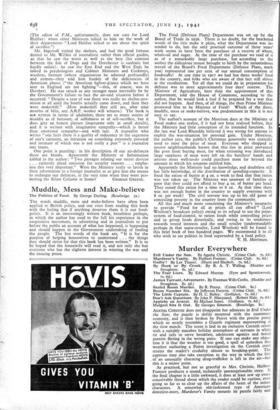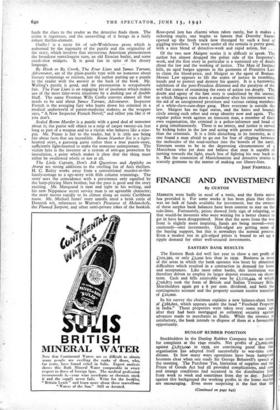Murder Everywhere .
AGATHA CHRISTIE .dOCS not disappoint her admirers in Evil Under the Sun; the puzzle is deftly mounted with the customary economy, and is then broken by Poirot with the precise pomp which -so nearly resembles a Guards regiment manoeuvring at the slow march. The scene is laid in an exclusive Cornish- resort with a suitably Macabre holiday atmosphere of servants in white tie and -tails to serve breakfast, adolescent agonies and bored parents flirting in the wrong pairs. If one can make any objec- tion it is that the: weather is too good, a spell of unbroken fine weather outlasting _a Poirot investigation on the Cornish coast strains the reader's credulity almost to breaking-point. The captious - may also take exception to the way in which the fate of an unusually charming drug-trafficker is left in the air—but this is a minor point. As practised, but not as graceful as Mrs. Christie, Hulbert Footner produces a sound, technically unexceptionable story. If the final chapter is a little awkward, it does at least sew up every conceivable thread about which the reader could be curious, even going so far as to clear up the affairs of the heart of the minor characters. A somewhat old-fashioned type of American detective-story, Murderer's Vanity mounts its puzzle fairly and
feeds the clues to the reader as the detective finds them. The crime is ingenious, and the unravelling of it brings in a fairly robust thriller-element.
Guilty ! is a nasty bit of sub-Wodehouse prose which is redeemed by the ingenuity of the puzzle and the originality of the story, which involves that mysterious American phenomenon the broadcast ventriloquist turn, an old Etonian butler, and some crack-shot midgets. It is good fun in spite of the dreary language.
By Hook or By Crook, The Four Liars and James Tarrant, Adventurer, are of the plain-puzzle type with no nonsense about literary trimmings or realism, just the author putting up a puzzle to the reader with the answer at the back of the book. Mr. Walling's puzzle is good, and the presentation is scrupulously fair. The Four Liars is an engaging bit of insolence which makes use of the most time-worn situations by a dashing use of double bluff. The name Freeman Wills Crofts conveys almost all that needs to be said about James Tarrant, Adventurer. Inspector French is the avenging fury who hunts down his criminal in a medical underworld of patent-medicine makers; as the wrapper says, " A New Inspector French Novel," and either you like it or you don't.
Sealed Room Murder is a puzzle with a good deal of nonsense about it; the purist will object to a strip of carpet twenty-six feet long as part of a weapon and to a victim who behaves like a nine- pin. Mr. Penny is fair to the reader, but it is little use being fair about facts that are incredible. Room Number Six is a light- hearted story, a guessing game rather than a true puzzle-story, sufficiently light-hearted to make the nonsense unimportant. The victim here is the inventor of a system of anti-gas protection by inoculation, a point which makes it clear that the thing must either be swallowed whole or not at all.
The Little Captain, Don't Ask Questions and Appleby on Ararat are strong additions to the swelling list of Axis thrillers. H. C. Bailey works away from a conventional murder-at-the- lonely-cottage to a spy-story with fifth column trimmings. The story uses the coincidence with a persistence only equalled by the harp-playing Marx brother, but the pace is good and the story exciting. Mr. Marquand is neat and tight in his writing, and his new Nipponese secret service man is an agreeable character; the story moves rapidly to its climax along an exotic Caribbean route. Mr. Michael Innes' story unrolls amid a brisk rattle of Donnish wit, references to Warton's Pleasures of Melancholy, the Plumed Serpent, and other semi-private jokes of the bookish. Rose-petal jam has charms when taken rarely, but it makes a sickening staple; one begins to lament that Dorothy Sayers opened up the fresh track now thronged by such a host of giggling travellers. The story under all the ormulu is pretty good, with a nice blend of detective-work and rapid action, but . •
Of the two new Maigret stories it is difficult to speak. The author has almost dropped the police side of the Inspector's work, and the first story in particular is a sustained cry of doubt about the law and the working of justice. The Man of Instinct kills, an aged bargee appears in the garments of Primitive Law to claim the blood-price, and Maigret as the agent of Roman- Mosaic Law appears to lift the scales of justice in trembling hands and to protect and destroy his quarry. It is a harrowing exhibition of the post-Freudian dilemma and the paralysis of the will that comes of examining the roots of action too deeply. The doubt and agony of the fit story is underlined by the second, in which Maigret runs down a murderer after his retirement with the aid of an unregistered prostitute and various ratting members of a white-slave-cum-dope gang. Here everyone is outside the law. Maigret has no legal status, and the hares and hounds circle among each other and swap identity now and again. The regular police work against an innocent man, a member of their own organisation, the criminal is a police-informer and head of a gang simultaneously. There is no mercy, and justice is served by kicking holes in the law and acting with greater ruthlessness than the criminals. It is a little disturbing in its intensity, as if one found a man afraid to go out for fear of slipping between the molecules of the road-surface into the bowels of the earth. Simenon seems to be in the depressing circumstances of a Manichean who yet does not believe that man is capable of turning towards the light, much less of fighting his way back to it. But the connexion of Manicheanism and detective stories is scarcely germane to the matter of making out library-lists.
JOHN- FAIRFIELD.



























 Previous page
Previous page